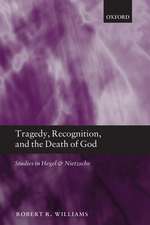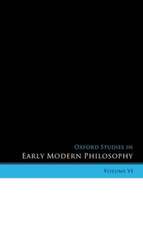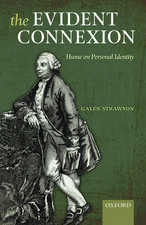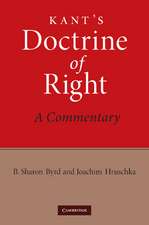Metaphysics: A Critical Translation with Kant's Elucidations, Selected Notes, and Related Materials
Autor Alexander Gottlieb Baumgarten Traducere de Courtney D. Fugate, John Hymersen Limba Engleză Paperback – 12 mar 2014
Preț: 192.59 lei
Nou
Puncte Express: 289
Preț estimativ în valută:
36.86€ • 37.99$ • 31.12£
36.86€ • 37.99$ • 31.12£
Carte tipărită la comandă
Livrare economică 03-17 martie
Preluare comenzi: 021 569.72.76
Specificații
ISBN-13: 9781472570130
ISBN-10: 1472570138
Pagini: 496
Dimensiuni: 156 x 234 x 30 mm
Greutate: 0.73 kg
Editura: Bloomsbury Publishing
Colecția Bloomsbury Academic
Locul publicării:London, United Kingdom
ISBN-10: 1472570138
Pagini: 496
Dimensiuni: 156 x 234 x 30 mm
Greutate: 0.73 kg
Editura: Bloomsbury Publishing
Colecția Bloomsbury Academic
Locul publicării:London, United Kingdom
Caracteristici
Supported by philosophical and historical introductions and sketches, extensive reading notes and a glossary
Notă biografică
Alexander Baumgarten (1714 - 1762) was among the first to teach the controversial philosophy of Christian Wolff (1769-1764). By order of the king, he moved to Frankfurt on the Order in 1739, where he remained until his death in 1762. His most influential philosophical works are Metaphysics (1739), Philosophical Ethics (1740), and Aesthetics (2 Vols, 1750 & 1757). It is as formulated in these works that the Leibniz-Wolff tradition was chiefly communicated to later German philosophers, including Immanuel Kant. Today Baumgarten is also regarded as a central founder of modern aesthetics.John Hymers is Assistant Professor of Philosophy at La Salle University, USA.Courtney D. Fugate is Assistant Professor at the American University of Beirut, Lebanon.
Cuprins
Part I: Introduction to the Translation Introduction 1. Alexander Gottlieb Baumgarten (1714-1762) and Georg Friedrich Meier (1718-1777): A historical sketch 2. The philosophical context of the Metaphysics 3. Kant's Handwritten Notes to the Metaphysics 4. Notes on this translation Part II: The Translation Alexander Baumgarten's Metaphysics Johann August Eberhard's Preface to the Second German Edition (1783) Georg Friedrich Meier's Preface to the First German Translation (1766) Preface of the third edition (1750) Preface of the second edition (1743) To the listener of good will [preface to the first edition](1739) Synopsis Prolegomena to Metaphysics Part I: Ontology Prologomena Chapter I. The universal internal predicates of a being Chapter II. The internal disjunctive predicates of a being Chapter III. The relative predicates of a being Part II: Cosmology Prologomena Chapter I. The concept of the world Chapter II. The parts of the universe Chapter III. The perfection of the universe Part III: Psychology Prolegomena Chapter I. Empirical psychology Chapter II. Rational psychology Part IIII: Natural theology Prolegomena Chapter I. The concept of God Chapter II. The operations of GodPart III: Ancillary Materials Glossary Latin-English English-Latin Notes and Textual variantsSelected Bibliography Index to the paragraphs of the Metaphysics General Index
Recenzii
Baumgarten's Metaphysica was both a refined restatement of the German rationalism of Leibniz and Wolff and an original work of philosophy. Not merely the textbook for Immanuel Kant's lectures on metaphysics and anthropology, it fundamentally shaped Kant's "Critical Philosophy" and through that most of later German philosophy. This lucid translation finally makes Baumgarten's seminal work available in English . . . indispensable for all future students of Kant and German philosophy.
Baumgarten's manual was enormously influential and widely discussed in Kant's time in matters such as metaphysics, cosmology, and psychology. Kant used it repeatedly in many of his courses and annotated it extensively. This volume offers the first full translation of Baumgarten's Metaphysics (in its fourth, 1757 edition) in English, inclusive of Kant's hand-written elucidations. It is a very welcome addition to the primary sources available to scholars. The current state of debate makes this a timely contribution that will help anyone interested in Kant to gauge in a more accurate and historically informed fashion the extent of his relation to his eighteenth-century German predecessors. Fugate and Hymers' rich, attentive and scrupulous critical notes never make the reader feel unassisted in this undertaking.
Of all the philosophical works of Kant's predecessors and contemporaries that have remained untranslated into English in their entirety, Alexander Baumgarten's Metaphysics is likely the most important for an understanding of Kant's theoretical philosophy. But Fugate and Hymers' volume goes well beyond what we could have reasonably hoped for. It provides not only a meticulous translation of Baumgarten's Metaphysics and lengthy notes on the translation, but also an overview of Baumgarten's life and philosophy, an assessment of the relations of this philosophy to the philosophies of Wolff, Leibniz, Meier, and Kant; a translation of all of Kant's Erläuterungen (elucidations) of Baumgarten's text; and an extensive glossary and index. Fugate and Hymers have simply produced an exceptional volume that will be of great value to Kant scholarship, and we can only hope that they will engage in similar translation projects in the future.
The influence of Baumgarten's philosophy in the eighteenth century, and on Kant's system in particular, cannot be overestimated. Its structure is a major catalyst for the form and content of much of even Kant's critical work, and especially of its metaphysics. This new English edition is therefore essential reading for all scholars interested in the most substantive work of the period.
A splendid and permanent contribution to the study of modern philosophy. The well-researched and fully accurate English translation of Baumgarten's work takes proper account of contemporaneous Latin usage as well as key philosophical concepts, especially the concepts underlying the development of metaphysical thinking in eighteenth-century Germany after Leibniz. The translators' historically contextualizing introduction, textual annotations, and ancillary translations of Kant's notes on the Metaphysica will thus be remarkably useful to anyone who wants to understand what goes on in a highly significant phase of early modern philosophy. It almost goes without saying that Kant scholars should find this book indispensable. It is, for example, the ideal accompanying volume for graduate seminars on The Critique of Pure Reason that seek to come to grips directly with Kant's own understanding of metaphysics.
Such texts are invaluable, providing the evidentiary basis for the best of the history of philosophy ... A brilliant edition!
Fugate and Hymers's translation of Baumgarten's Metaphysica is an excellent contribution to the historical, contextual and comparative study of eighteenth-century German philosophy. In addition to highlighting Baumgarten's own contributions to philosophy during this period, their translation will help scholars understand the relationship between the Leibnizian-Wolffian philosophy and Kant's philosophy more critically.
Baumgarten's manual was enormously influential and widely discussed in Kant's time in matters such as metaphysics, cosmology, and psychology. Kant used it repeatedly in many of his courses and annotated it extensively. This volume offers the first full translation of Baumgarten's Metaphysics (in its fourth, 1757 edition) in English, inclusive of Kant's hand-written elucidations. It is a very welcome addition to the primary sources available to scholars. The current state of debate makes this a timely contribution that will help anyone interested in Kant to gauge in a more accurate and historically informed fashion the extent of his relation to his eighteenth-century German predecessors. Fugate and Hymers' rich, attentive and scrupulous critical notes never make the reader feel unassisted in this undertaking.
Of all the philosophical works of Kant's predecessors and contemporaries that have remained untranslated into English in their entirety, Alexander Baumgarten's Metaphysics is likely the most important for an understanding of Kant's theoretical philosophy. But Fugate and Hymers' volume goes well beyond what we could have reasonably hoped for. It provides not only a meticulous translation of Baumgarten's Metaphysics and lengthy notes on the translation, but also an overview of Baumgarten's life and philosophy, an assessment of the relations of this philosophy to the philosophies of Wolff, Leibniz, Meier, and Kant; a translation of all of Kant's Erläuterungen (elucidations) of Baumgarten's text; and an extensive glossary and index. Fugate and Hymers have simply produced an exceptional volume that will be of great value to Kant scholarship, and we can only hope that they will engage in similar translation projects in the future.
The influence of Baumgarten's philosophy in the eighteenth century, and on Kant's system in particular, cannot be overestimated. Its structure is a major catalyst for the form and content of much of even Kant's critical work, and especially of its metaphysics. This new English edition is therefore essential reading for all scholars interested in the most substantive work of the period.
A splendid and permanent contribution to the study of modern philosophy. The well-researched and fully accurate English translation of Baumgarten's work takes proper account of contemporaneous Latin usage as well as key philosophical concepts, especially the concepts underlying the development of metaphysical thinking in eighteenth-century Germany after Leibniz. The translators' historically contextualizing introduction, textual annotations, and ancillary translations of Kant's notes on the Metaphysica will thus be remarkably useful to anyone who wants to understand what goes on in a highly significant phase of early modern philosophy. It almost goes without saying that Kant scholars should find this book indispensable. It is, for example, the ideal accompanying volume for graduate seminars on The Critique of Pure Reason that seek to come to grips directly with Kant's own understanding of metaphysics.
Such texts are invaluable, providing the evidentiary basis for the best of the history of philosophy ... A brilliant edition!
Fugate and Hymers's translation of Baumgarten's Metaphysica is an excellent contribution to the historical, contextual and comparative study of eighteenth-century German philosophy. In addition to highlighting Baumgarten's own contributions to philosophy during this period, their translation will help scholars understand the relationship between the Leibnizian-Wolffian philosophy and Kant's philosophy more critically.














